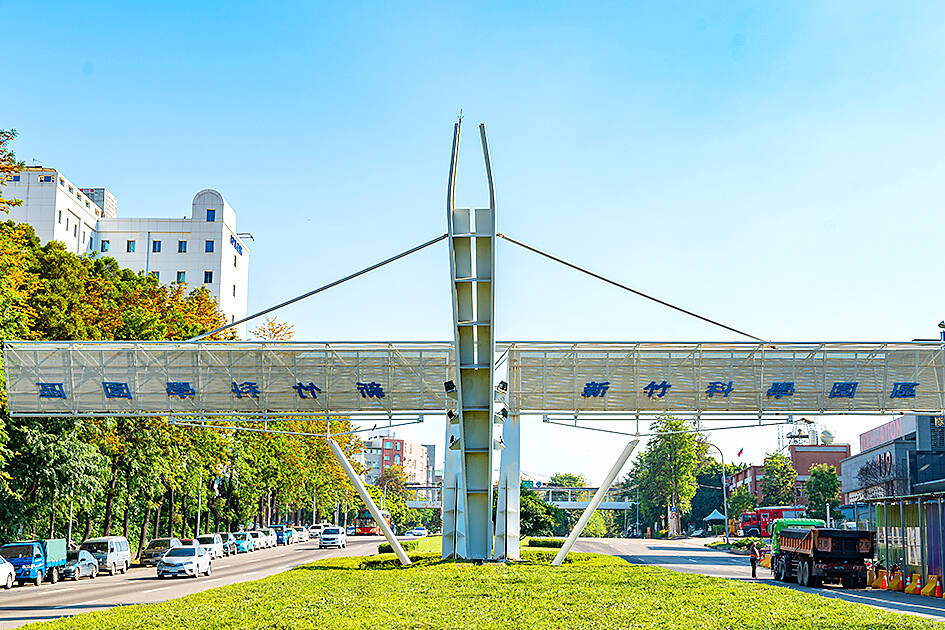The Hsinchu Science Park (新竹科學園區) administration on Monday said that the Cabinet had approved its latest park expansion project, paving the way for Taiwan Semiconductor Manufacturing Co (TSMC, 台積電) to start construction on a next-generation fab there as early as 2026.
The administration plans to convert 158.59 hectares of mostly farmland in Taoyuan County’s Longtan District (龍潭) into an industrial area, mostly for the semiconductor industry, an outline of the project posted on the administration’s Web site on June 16 said.
The outline was posted with the aim of seeking public opinion.

Photo courtesy of the Hsinchu Science Park administration
The bulk of the newly developed land, the third park expansion project proposed by the administration, would be used by TSMC to build advanced semiconductor manufacturing facilities to make 2-nanometer chips, or smaller and more advanced chips, the administration said.
TSMC has built a pilot production line for 3-nanometer chips and is building a 2-nanometer chip factory using the land acquired by the administration through two expansion projects, it added.
The world’s largest contract chipmaker’s 3-nanometer chips entered mass production at its Tainan fab in the second half of last year.
TSMC chief executive officer C.C. Wei (魏哲家) told shareholders early this month that the company was on track to ramp up volume production of 2-nanometer chips in Taiwan in 2025.
TSMC is also developing next-generation technology to produce 1.4-nanometer chips at home, he said.
The expansion project is expected to create NT$600 billion to NT$650 billion (US$19.34 billion to US$20.95 billion) in production value a year, due to growing demand for chips used in electric vehicles, wearable devices and artificial-intelligence applications, the administration said.
About 5,900 new jobs would be created, it said.
The administration said it plans to hold two public hearings next month to collect the public opinion before submitting a detailed development plan to the Cabinet by the end of this year.
The administration said it needs to address a shortage of industrial land as more than 90 percent of the land managed by Hsinchu Science Park has been used and 99 percent of the land in Longtan has been leased.

CAUTIOUS RECOVERY: While the manufacturing sector returned to growth amid the US-China trade truce, firms remain wary as uncertainty clouds the outlook, the CIER said The local manufacturing sector returned to expansion last month, as the official purchasing managers’ index (PMI) rose 2.1 points to 51.0, driven by a temporary easing in US-China trade tensions, the Chung-Hua Institution for Economic Research (CIER, 中華經濟研究院) said yesterday. The PMI gauges the health of the manufacturing industry, with readings above 50 indicating expansion and those below 50 signaling contraction. “Firms are not as pessimistic as they were in April, but they remain far from optimistic,” CIER president Lien Hsien-ming (連賢明) said at a news conference. The full impact of US tariff decisions is unlikely to become clear until later this month

Popular vape brands such as Geek Bar might get more expensive in the US — if you can find them at all. Shipments of vapes from China to the US ground to a near halt last month from a year ago, official data showed, hit by US President Donald Trump’s tariffs and a crackdown on unauthorized e-cigarettes in the world’s biggest market for smoking alternatives. That includes Geek Bar, a brand of flavored vapes that is not authorized to sell in the US, but which had been widely available due to porous import controls. One retailer, who asked not to be named, because

CHIP DUTIES: TSMC said it voiced its concerns to Washington about tariffs, telling the US commerce department that it wants ‘fair treatment’ to protect its competitiveness Taiwan Semiconductor Manufacturing Co (TSMC, 台積電) yesterday reiterated robust business prospects for this year as strong artificial intelligence (AI) chip demand from Nvidia Corp and other customers would absorb the impacts of US tariffs. “The impact of tariffs would be indirect, as the custom tax is the importers’ responsibility, not the exporters,” TSMC chairman and chief executive officer C.C. Wei (魏哲家) said at the chipmaker’s annual shareholders’ meeting in Hsinchu City. TSMC’s business could be affected if people become reluctant to buy electronics due to inflated prices, Wei said. In addition, the chipmaker has voiced its concern to the US Department of Commerce

STILL LOADED: Last year’s richest person, Quanta Computer Inc chairman Barry Lam, dropped to second place despite an 8 percent increase in his wealth to US$12.6 billion Staff writer, with CNA Daniel Tsai (蔡明忠) and Richard Tsai (蔡明興), the brothers who run Fubon Group (富邦集團), topped the Forbes list of Taiwan’s 50 richest people this year, released on Wednesday in New York. The magazine said that a stronger New Taiwan dollar pushed the combined wealth of Taiwan’s 50 richest people up 13 percent, from US$174 billion to US$197 billion, with 36 of the people on the list seeing their wealth increase. That came as Taiwan’s economy grew 4.6 percent last year, its fastest pace in three years, driven by the strong performance of the semiconductor industry, the magazine said. The Tsai